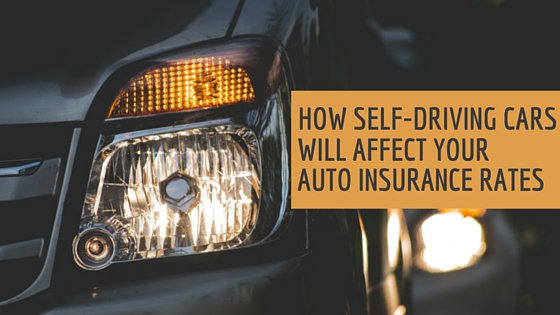How Self-Driving Cars Will Affect Your Auto Insurance Rates

Download this episode:
On iTunes | On Stitcher
Although self-driving cars have garnered various kinds of media attention lately, one thing is clear: the revolution is underway and won’t slow down any time soon. By 2020, an estimated 10 million cars will be outfitted with self-driving features.
A future of self-driving cars could change many things. In this podcast episode, we discuss what changes this revolution could bring to your auto insurance.
How safe are self-driving cars?
It is reported that 90 percent of accidents are caused by driver error. Over the next 25 years, self-driving vechicles may help reduce the rate of accidents by 80 percent. Self-driving cars rely on a complex system of active safety sensors, cameras and a central computer to function, making them safer than they sound. In fact, the Insurance Institute for Highway Safety says systems like forward-collision warning are already reducing accidents.
However, the autonomous driving technology is not completely fail-proof and flawless. A self-driving Tesla was involved in the first-known fatal car crash involving a car in self-driving mode in May, and a Google self-driving car caused a crash for the first time in February.
How self-driving cars will affect auto insurance rates
The U.S. market for personal auto insurance policies currently generates $200 billion in premiums a year. However, insurance premiums could change significantly as self-driving cars become more prevalent.
Before adjusting insurance premiums, insurers will need to answer this question: How much would the liability for crashes shift from drivers to the vehicles that are making most – if not all – of the safety decisions?
If the vehicle’s technology is making these decisions, automakers and their suppliers may shoulder most of the liability. If so, they might offer auto insurance themselves. While this will certainly disrupt the industry, having automakers take on insurance costs may not be good for consumers.
Automakers may increase the price of vehicles to make up for increased operating costs, meaning that self-driving cars may not save consumers much money.
Other questions, such as whether different cars with different self-driving systems will be insured differently, must still be answered. These answers will also affect how premiums are set in the future.
British company Adrian Flux Insurance Services recently launched what it said might be the first “driverless car policy” in the world. The policy would cover existing cars using autonomous features, such as self-parking and autopilot system, and system disruptions like satellite failures or hacking by outsiders.



